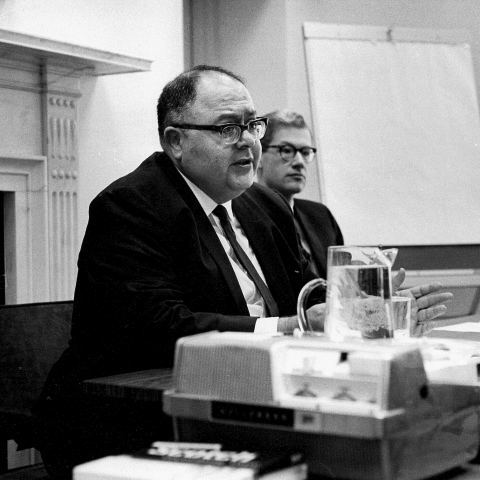A federal appeals court in Washington slapped the Federal Communications Commission on Tuesday for overstepping its legal authority by trying to regulate Internet access. The FCC is now a two-time loser in court in its net-neutrality efforts. Has the government learned its lesson, or will the agency take a third stab at regulating the Internet? The answer to that question will affect the Internet's growth in the 21st century.
The FCC's quest to regulate the Internet began in 2010, when the commission first promulgated rules for net neutrality. The rules, proponents argue, are needed to police Internet "on-ramps" (Internet service providers) ostensibly to ensure that they stay "open." To accomplish this, some want the FCC to subject the Internet to ancient communications laws designed for extinct phone and railroad monopolies.
But the trouble is, nothing needs fixing. The Internet has remained open and accessible without FCC micromanagement since it entered public life in the 1990s. And more regulation could produce harmful results, such as reduced infrastructure investment, stunted innovation, slower speeds and higher prices for consumers. The FCC never bothered to study the impact that such intervention might have on the broadband market before leaping to regulate. Nor did it consider the ample consumer-protection laws that already exist. The government's meddling has been driven more by ideology and a 2008 campaign promise by then-Sen. Barack Obama than by reality.
Further FCC attempts to regulate the Internet could trigger global regulation of the Internet by the International Telecommunication Union, a treaty-based organization under the U.N.'s control. Russian President Vladimir Putin and his allies have been working for a decade to upend a 1988 agreement—forged by delegates from 114 countries—to leave the Internet unfettered. The U.S. has so far been opposed to applying new international rules for the Internet. In October, 193 countries will gather again for talks to conclude a new treaty that will decide the Internet's fate. Proponents hope to build off victories won last year at International Telecommunication Union talks in Dubai that gave the agency narrow authority to regulate. The goal is to achieve what Mr. Putin summarized in 2011 as "international control of the Internet."
The prospect of multilateral regulation makes the FCC's next move all the more important, as it will set the standard for what happens in the next round of negotiations in South Korea. The U.S. argument that regulation of the Internet at home is a good idea but a bad one internationally is eroding American credibility. The U.S. attempt to have it both ways has inspired scorn from other countries, as I personally experienced during official meetings in Dubai in 2012.
Which is why the FCC should drop its pursuit of net-neutrality rules altogether. The regulations are a bad idea for many reasons, but especially because they radically depart from—and endanger—the highly successful, nongovernmental, private-sector-led, "multi-stakeholder" process for resolving the Internet's technical challenges. Under this loose structure, engineers, academics and users from all over the world work individually to keep a borderless "network of networks" open and thriving. The flat and dispersed architecture of the Internet defies centralized and top-down control: No government is capable of keeping up with the Web's warp-speed evolution. The nimble multi-stakeholder structure of Internet governance, which enjoyed broad bipartisan and international support during the Clinton and Bush administrations, has made the Internet the greatest deregulatory success story of all time.
As a result of this framework for innovation, Internet usage has penetrated faster than any technology in history. Rapid adoption of Internet-enabled mobile devices is profoundly improving the lives of billions of people, especially in the developing world. It is also helping to change their political expectations as it strengthens the sovereignty of the individual by providing fast and inexpensive access to the world's information. Authoritarian regimes feel threatened by unfettered Internet access. That's why they've embarked on a patient diplomatic strategy to accrue power over its on-ramps.
Pursuing an expanded U.S. government role into the Internet's affairs foolishly plays into the hands of these pro-regulation regimes. At a minimum, new American rules provide them with political cover and the veneer of a rational argument to use for their own nefarious ends. Especially in light of current concerns about National Security Agency surveillance, it should be obvious that the problem of too much state interference with the Internet will not be cured by even more government meddling, either domestically or internationally. Now is a chance to turn back the tide of state encroachment.
The U.S. government must reverse course immediately. First, the FCC should abandon any further legal appeals of its case. Next, the FCC should unequivocally restate its commitment to the multi-stakeholder model of resolving network-management challenges and Internet governance. Then, the commission should work with antitrust and consumer-protection agencies to take an inventory of all existing laws that could either prevent or cure anticompetitive conduct in the Internet sphere, instead of making new rules. This will be essential to the International Telecommunication Union negotiations in the fall, as proponents of global rules just need a simple majority of the 193 to impose their agenda.
In short, governments could have a seat at the multi-stakeholder Internet-governance table, they just shouldn't own the table. The existing paradigm has produced positive and constructive results and will continue to do so if governments stay out of the way.
Otherwise, the consequences of multilateral control of the Internet could cause a radical disruption of the digital economy that would harm tomorrow's Internet users in the developing world the most. It is not too late to turn back these assaults on Internet freedom, but we are running out of time.













